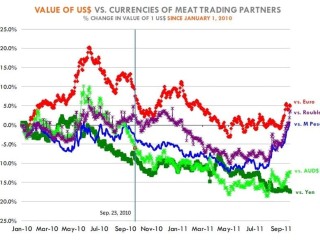 With the A$ dipping below US98c in trade overnight, it sets up some intriguing possibilities in international beef markets, where the US has suddenly emerged as the world’s largest exporter on the strength of its currency competitiveness this year.
With the A$ dipping below US98c in trade overnight, it sets up some intriguing possibilities in international beef markets, where the US has suddenly emerged as the world’s largest exporter on the strength of its currency competitiveness this year.
Respected US analysts, Len Steiner and Steve Meyer from the Chicago Mercantile Exchange this morning discussed some of the implications in recent currency movements in their Daily Livestock Report.
“US livestock producers sometimes roll their eyes when market analysts start talking about currency rates and world equity markets,” Mr Steiner said.
“After all, it’s not that obvious what the exchange rate for the Korean Won has to do with the price of cattle in a Texas ranch. Our view has always been that currency rates bear watching, both for the effect they have on trade volume as well as for what they tell us about the global economy,” he said.
“For better or worse, we live in a world that has never been more integrated than it is today. Back in April, we wondered whether the US was about to pay the price for the sins of ‘sub-prime’ nations in Europe. At the time the question seemed a little over-the-top, given projections for good US economic growth and hope that the EU would shore-up the finances of its weak members.”
“But since then, we have seen a significant deterioration in world economic conditions and there is a real likelihood of a full-blown financial and debt crisis triggered by a Greek sovereign debt default,” Mr Steiner said.
“Currency markets have responded to the growing uncertainty in world markets. While long-term, one can make an argument that the US$ will remain weak, in the short-term, it appears that other parts of the world, particularly the Euro zone, have bigger problems than the US.”
Furthermore, as market participants pulled back from risky bets in equity markets in other parts of the world, they were putting their money in US bonds and US$ denominated assets. Similarly, demand for assets denominated in Japanese Yen also continued to rise.
As the chart published here shows, the US$ has strengthened considerably versus a basket of other currencies where US beef trades or competes, as it has against the Canadian dollar and the Brazilian Real.
Indeed, since late July, the Canadian dollar has declined 9pc versus the US$, Mr Steiner pointed out.
“On July 26, it took US$1.06 to purchase 1 CAD. Today, December futures are priced at US$0.967 to purchase 1 CAD.”
Canada had been a significant buyer of US beef so far this year, in part because of the strong Canadian currency. The currency shift has now made US beef products significantly more expensive and it was now likely US beef exports to Canada, Mexico and other markets would slow from the fourth quarter, starting October 1.
“One would think that US shipments to Japan will remain strong given that the US$ continues to drift lower versus the Yen,” Mr Steiner said. “But the Yen has strengthened even more versus the Australian dollar, and the net effect of the cross currency shifts will likely be limited,” he said.
On the imported beef front, it was ‘very likely’ that the US would now import more Australian and New Zealand beef later this year due to the sharp depreciation in those currencies.
December futures show that as of yesterday, it took US$0.9729 to purchase 1 Australian dollar, about 10pc less than in late July.
“The bottom line is that the stronger US$ has made US meat protein more expensive for foreign buyers, while making imported beef less expensive for US buyers,” Mr Steiner said.
US cattle prices are also down, in part because of the expected lower exports ahead, but also because of fears that another recession will hit beef prices hardest.
- * Beef Central provides a daily update on the A$:US$ value, plus other key 'benchmark' meat and livestock industry indicators, on the graph panel appearing on the home-page.
